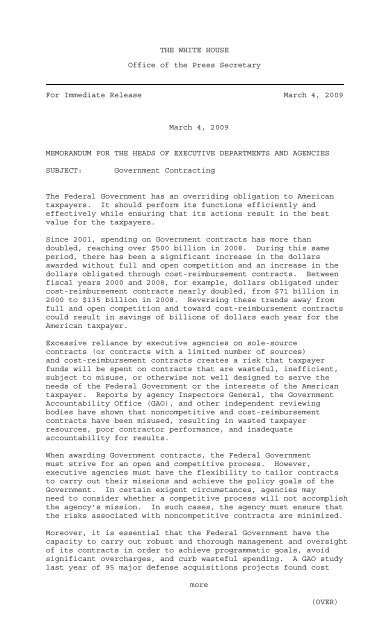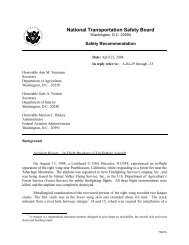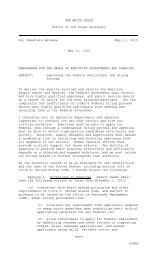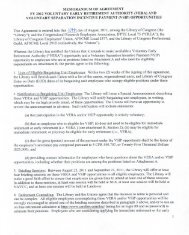Memorandum to the Heads and Acting Heads of Agencies and ...
Memorandum to the Heads and Acting Heads of Agencies and ...
Memorandum to the Heads and Acting Heads of Agencies and ...
You also want an ePaper? Increase the reach of your titles
YUMPU automatically turns print PDFs into web optimized ePapers that Google loves.
THE WHITE HOUSEOffice <strong>of</strong> <strong>the</strong> Press SecretaryFor Immediate Release March 4, 2009March 4, 2009MEMORANDUM FOR THE HEADS OF EXECUTIVE DEPARTMENTS AND AGENCIESSUBJECT:Government ContractingThe Federal Government has an overriding obligation <strong>to</strong> Americantaxpayers. It should perform its functions efficiently <strong>and</strong>effectively while ensuring that its actions result in <strong>the</strong> bestvalue for <strong>the</strong> taxpayers.Since 2001, spending on Government contracts has more th<strong>and</strong>oubled, reaching over $500 billion in 2008. During this sameperiod, <strong>the</strong>re has been a significant increase in <strong>the</strong> dollarsawarded without full <strong>and</strong> open competition <strong>and</strong> an increase in <strong>the</strong>dollars obligated through cost-reimbursement contracts. Betweenfiscal years 2000 <strong>and</strong> 2008, for example, dollars obligated undercost-reimbursement contracts nearly doubled, from $71 billion in2000 <strong>to</strong> $135 billion in 2008. Reversing <strong>the</strong>se trends away fromfull <strong>and</strong> open competition <strong>and</strong> <strong>to</strong>ward cost-reimbursement contractscould result in savings <strong>of</strong> billions <strong>of</strong> dollars each year for <strong>the</strong>American taxpayer.Excessive reliance by executive agencies on sole-sourcecontracts (or contracts with a limited number <strong>of</strong> sources)<strong>and</strong> cost-reimbursement contracts creates a risk that taxpayerfunds will be spent on contracts that are wasteful, inefficient,subject <strong>to</strong> misuse, or o<strong>the</strong>rwise not well designed <strong>to</strong> serve <strong>the</strong>needs <strong>of</strong> <strong>the</strong> Federal Government or <strong>the</strong> interests <strong>of</strong> <strong>the</strong> Americantaxpayer. Reports by agency Inspec<strong>to</strong>rs General, <strong>the</strong> GovernmentAccountability Office (GAO), <strong>and</strong> o<strong>the</strong>r independent reviewingbodies have shown that noncompetitive <strong>and</strong> cost-reimbursementcontracts have been misused, resulting in wasted taxpayerresources, poor contrac<strong>to</strong>r performance, <strong>and</strong> inadequateaccountability for results.When awarding Government contracts, <strong>the</strong> Federal Governmentmust strive for an open <strong>and</strong> competitive process. However,executive agencies must have <strong>the</strong> flexibility <strong>to</strong> tailor contracts<strong>to</strong> carry out <strong>the</strong>ir missions <strong>and</strong> achieve <strong>the</strong> policy goals <strong>of</strong> <strong>the</strong>Government. In certain exigent circumstances, agencies mayneed <strong>to</strong> consider whe<strong>the</strong>r a competitive process will not accomplish<strong>the</strong> agency's mission. In such cases, <strong>the</strong> agency must ensure that<strong>the</strong> risks associated with noncompetitive contracts are minimized.Moreover, it is essential that <strong>the</strong> Federal Government have <strong>the</strong>capacity <strong>to</strong> carry out robust <strong>and</strong> thorough management <strong>and</strong> oversigh<strong>to</strong>f its contracts in order <strong>to</strong> achieve programmatic goals, avoidsignificant overcharges, <strong>and</strong> curb wasteful spending. A GAO studylast year <strong>of</strong> 95 major defense acquisitions projects found costmore(OVER)
overruns <strong>of</strong> 26 percent, <strong>to</strong>taling $295 billion over <strong>the</strong> life <strong>of</strong><strong>the</strong> projects. Improved contract oversight could reduce such sumssignificantly.2Government outsourcing for services also raises specialconcerns. For decades, <strong>the</strong> Federal Government has relied on<strong>the</strong> private sec<strong>to</strong>r for necessary commercial services used by <strong>the</strong>Government, such as transportation, food, <strong>and</strong> maintenance. Office<strong>of</strong> Management <strong>and</strong> Budget Circular A-76, first issued in 1966, wasbased on <strong>the</strong> reasonable premise that while inherently governmentalactivities should be performed by Government employees, taxpayersmay receive more value for <strong>the</strong>ir dollars if non-inherentlygovernmental activities that can be provided commercially aresubject <strong>to</strong> <strong>the</strong> forces <strong>of</strong> competition.However, <strong>the</strong> line between inherently governmental activitiesthat should not be outsourced <strong>and</strong> commercial activities that maybe subject <strong>to</strong> private sec<strong>to</strong>r competition has been blurred <strong>and</strong>inadequately defined. As a result, contrac<strong>to</strong>rs may be performinginherently governmental functions. <strong>Agencies</strong> <strong>and</strong> departments mus<strong>to</strong>perate under clear rules prescribing when outsourcing is <strong>and</strong> isnot appropriate.It is <strong>the</strong> policy <strong>of</strong> <strong>the</strong> Federal Government that executiveagencies shall not engage in noncompetitive contracts exceptin those circumstances where <strong>the</strong>ir use can be fully justified<strong>and</strong> where appropriate safeguards have been put in place <strong>to</strong>protect <strong>the</strong> taxpayer. In addition, <strong>the</strong>re shall be a preferencefor fixed-price type contracts. Cost-reimbursement contractsshall be used only when circumstances do not allow <strong>the</strong> agency <strong>to</strong>define its requirements sufficiently <strong>to</strong> allow for a fixed-pricetype contract. Moreover, <strong>the</strong> Federal Government shall ensure thattaxpayer dollars are not spent on contracts that are wasteful,inefficient, subject <strong>to</strong> misuse, or o<strong>the</strong>rwise not well designed<strong>to</strong> serve <strong>the</strong> Federal Government's needs <strong>and</strong> <strong>to</strong> manage <strong>the</strong> riskassociated with <strong>the</strong> goods <strong>and</strong> services being procured. TheFederal Government must have sufficient capacity <strong>to</strong> manage <strong>and</strong>oversee <strong>the</strong> contracting process from start <strong>to</strong> finish, so as <strong>to</strong>ensure that taxpayer funds are spent wisely <strong>and</strong> are not subject<strong>to</strong> excessive risk. Finally, <strong>the</strong> Federal Government must ensurethat those functions that are inherently governmental in natureare performed by executive agencies <strong>and</strong> are not outsourced.I hereby direct <strong>the</strong> Direc<strong>to</strong>r <strong>of</strong> <strong>the</strong> Office <strong>of</strong> Management<strong>and</strong> Budget (OMB), in collaboration with <strong>the</strong> Secretary <strong>of</strong>Defense, <strong>the</strong> Administra<strong>to</strong>r <strong>of</strong> <strong>the</strong> National Aeronautics <strong>and</strong>Space Administration, <strong>the</strong> Administra<strong>to</strong>r <strong>of</strong> General Services,<strong>the</strong> Direc<strong>to</strong>r <strong>of</strong> <strong>the</strong> Office <strong>of</strong> Personnel Management, <strong>and</strong> <strong>the</strong> heads<strong>of</strong> such o<strong>the</strong>r agencies as <strong>the</strong> Direc<strong>to</strong>r <strong>of</strong> OMB determines <strong>to</strong> beappropriate, <strong>and</strong> with <strong>the</strong> participation <strong>of</strong> appropriate managementcouncils <strong>and</strong> program management <strong>of</strong>ficials, <strong>to</strong> develop <strong>and</strong> issueby July 1, 2009, Government-wide guidance <strong>to</strong> assist agencies inreviewing, <strong>and</strong> creating processes for ongoing review <strong>of</strong>, existingcontracts in order <strong>to</strong> identify contracts that are wasteful,inefficient, or not o<strong>the</strong>rwise likely <strong>to</strong> meet <strong>the</strong> agency's needs,<strong>and</strong> <strong>to</strong> formulate appropriate corrective action in a timely manner.Such corrective action may include modifying or canceling suchcontracts in a manner <strong>and</strong> <strong>to</strong> <strong>the</strong> extent consistent with applicablelaws, regulations, <strong>and</strong> policy.more
I fur<strong>the</strong>r direct <strong>the</strong> Direc<strong>to</strong>r <strong>of</strong> OMB, in collaboration with <strong>the</strong>aforementioned <strong>of</strong>ficials <strong>and</strong> councils, <strong>and</strong> with input from <strong>the</strong>public, <strong>to</strong> develop <strong>and</strong> issue by September 30, 2009, Governmentwideguidance <strong>to</strong>:3(1) govern <strong>the</strong> appropriate use <strong>and</strong> oversight <strong>of</strong> sole-source<strong>and</strong> o<strong>the</strong>r types <strong>of</strong> noncompetitive contracts <strong>and</strong> <strong>to</strong> maximize <strong>the</strong>use <strong>of</strong> full <strong>and</strong> open competition <strong>and</strong> o<strong>the</strong>r competitive procurementprocesses;(2) govern <strong>the</strong> appropriate use <strong>and</strong> oversight <strong>of</strong> allcontract types, in full consideration <strong>of</strong> <strong>the</strong> agency's needs, <strong>and</strong><strong>to</strong> minimize risk <strong>and</strong> maximize <strong>the</strong> value <strong>of</strong> Government contractsgenerally, consistent with <strong>the</strong> regulations <strong>to</strong> be promulgatedpursuant <strong>to</strong> section 864 <strong>of</strong> Public Law 110-417;(3) assist agencies in assessing <strong>the</strong> capacity <strong>and</strong> ability <strong>of</strong><strong>the</strong> Federal acquisition workforce <strong>to</strong> develop, manage, <strong>and</strong> overseeacquisitions appropriately; <strong>and</strong>(4) clarify when governmental outsourcing for services is<strong>and</strong> is not appropriate, consistent with section 321 <strong>of</strong> PublicLaw 110-417 (31 U.S.C. 501 note).Executive departments <strong>and</strong> agencies shall carry out <strong>the</strong>provisions <strong>of</strong> this memor<strong>and</strong>um <strong>to</strong> <strong>the</strong> extent permitted by law.This memor<strong>and</strong>um is not intended <strong>to</strong>, <strong>and</strong> does not, create any righ<strong>to</strong>r benefit, substantive or procedural, enforceable at law or inequity by any party against <strong>the</strong> United States, its departments,agencies, or entities, its <strong>of</strong>ficers, employees, or agents, or anyo<strong>the</strong>r person.The Direc<strong>to</strong>r <strong>of</strong> OMB is hereby authorized <strong>and</strong> directed <strong>to</strong> publishthis memor<strong>and</strong>um in <strong>the</strong> Federal Register.BARACK OBAMA# # #













